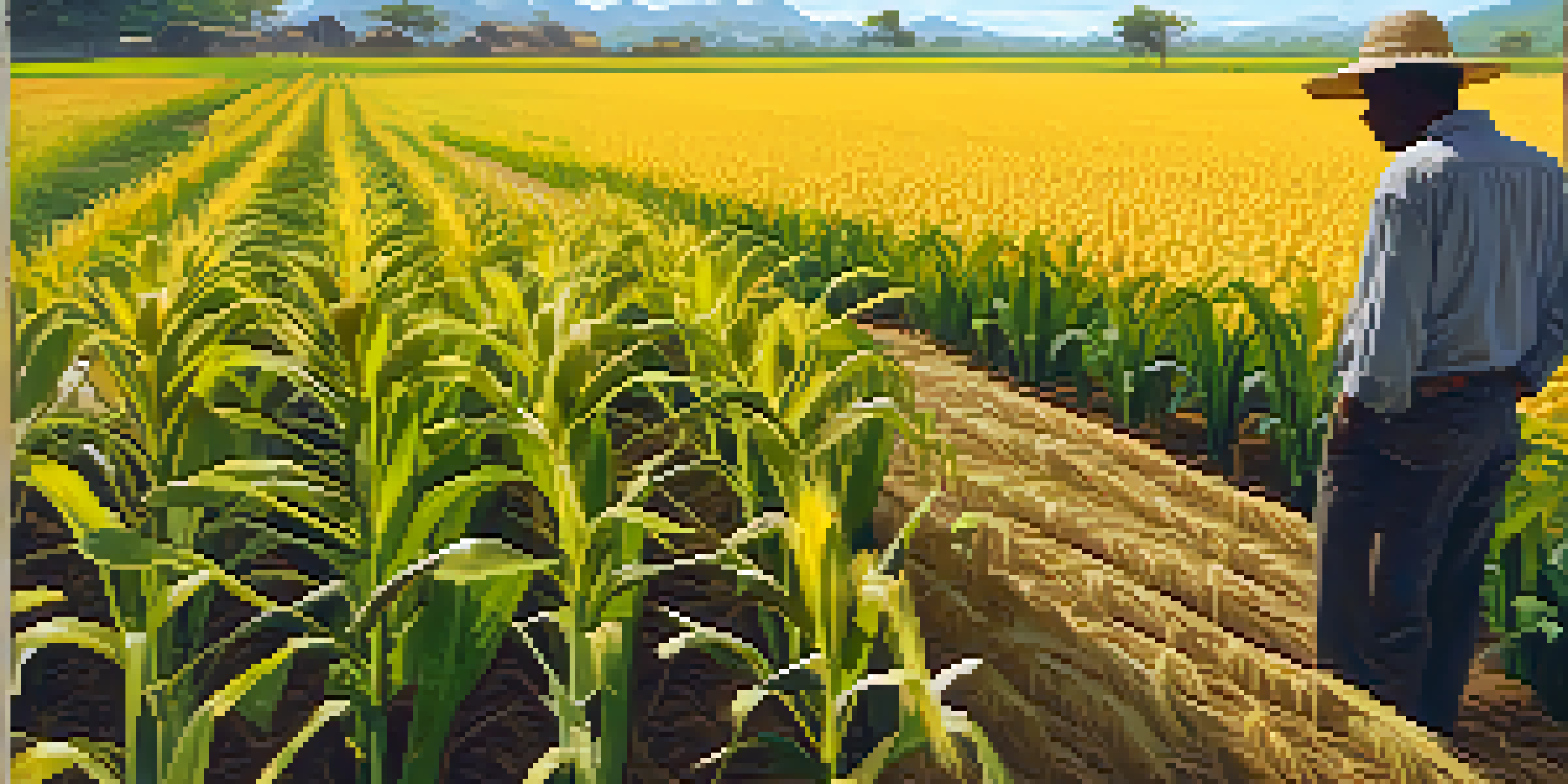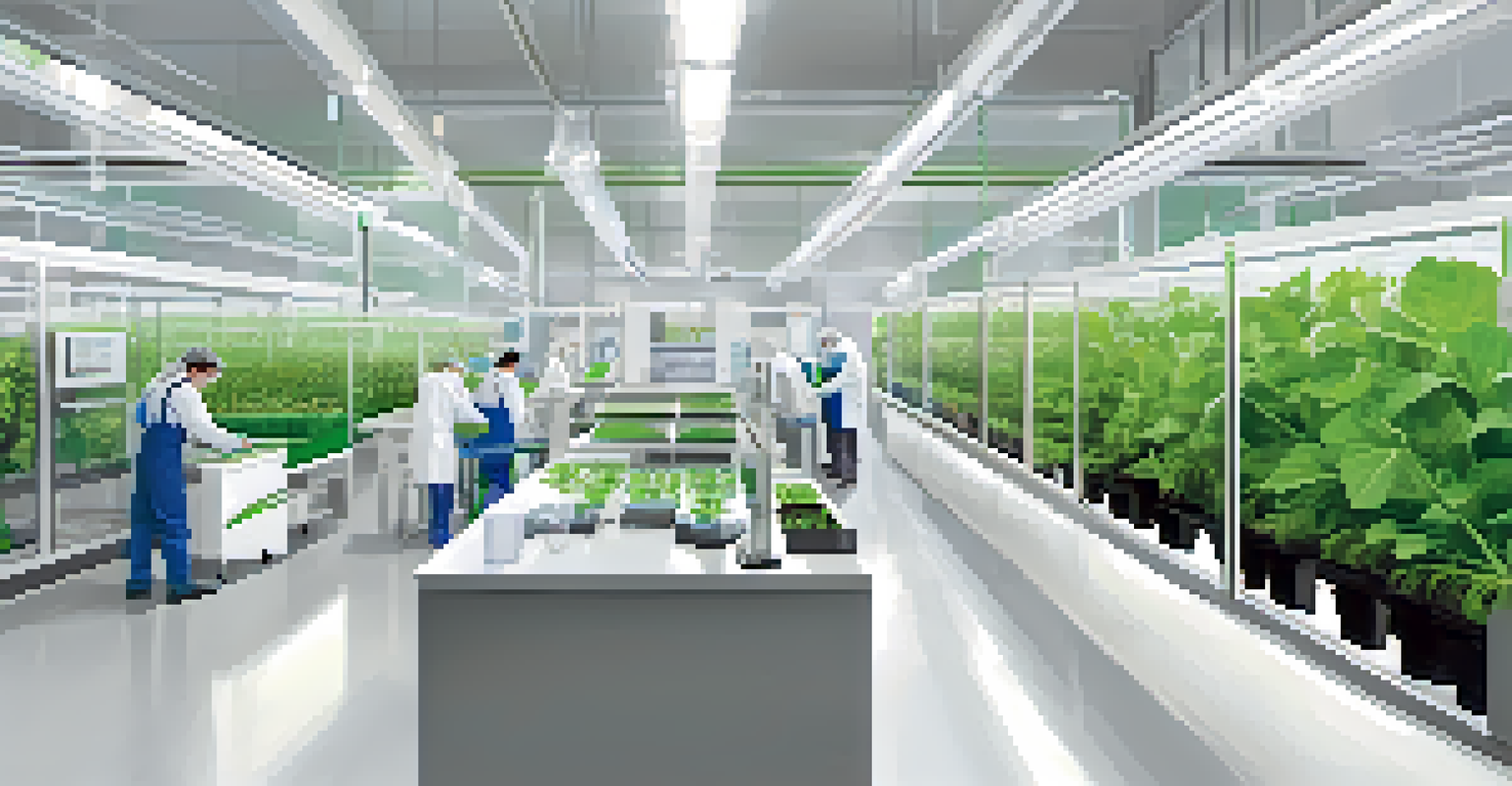The Importance of Climate-Adapted Crops for Future Food Security

Understanding Climate-Adapted Crops and Their Benefits
Climate-adapted crops are varieties specifically bred or selected to thrive in changing environmental conditions. This includes factors like altered rainfall patterns, increased temperatures, and the presence of new pests and diseases. By focusing on these crops, we can enhance agricultural resilience and maintain productivity even in challenging climates.
The greatest threat to our planet is the belief that someone else will save it.
For instance, drought-resistant maize can survive with less water, which is crucial as many regions face more frequent droughts. These crops not only help in sustaining yield but also reduce the need for chemical inputs, making farming more sustainable. The focus on such varieties can lead to a more secure food supply in the face of climate change.
Moreover, climate-adapted crops can be vital in preserving biodiversity. By diversifying crop choices, farmers can mitigate risks associated with monocultures, which are particularly vulnerable to climate impacts. This diversity ensures that if one crop fails, others may still thrive, contributing to overall food security.
The Link Between Climate Change and Food Security
Food security is intimately tied to climate stability. As climate change results in more unpredictable weather, food production systems face increasing pressure. Crop failures due to heatwaves, floods, or pests can lead to food shortages, driving up prices and causing malnutrition and hunger.

For example, the 2010 Russian heatwave devastated wheat production, causing global prices to soar. Such events highlight the fragility of our food systems and underscore the need for climate resilience. Without adapting our agricultural practices, we risk jeopardizing food availability for future generations.
Climate-Adaptive Crops Enhance Resilience
These crops are specifically bred to thrive under changing environmental conditions, ensuring food security despite climate challenges.
In response, investing in climate-adapted crops emerges as a proactive strategy. By prioritizing these crops, we can create a more robust agricultural framework that can withstand the impacts of climate change, ensuring that everyone has access to sufficient, safe, and nutritious food.
Innovation in Crop Breeding for Climate Resilience
Innovative breeding techniques are at the forefront of developing climate-adapted crops. Traditional methods, like selective breeding, are being enhanced by modern biotechnologies, including genetic engineering and CRISPR. These approaches allow for precise modifications that can help crops better resist environmental stresses.
We won't have a society if we destroy the environment.
For instance, scientists have developed rice varieties that can survive flooding, a significant issue in many rice-growing regions. This innovation not only boosts yield but also provides a safety net for farmers facing unpredictable weather. Such advancements are crucial for adapting to climate variability and ensuring food production remains steady.
Additionally, these breeding programs often involve local farmers, ensuring that the crops developed are suited to specific regional conditions. This participatory approach helps to align scientific research with traditional knowledge, fostering a sense of ownership and commitment among communities.
The Role of Agroecology in Sustainable Practices
Agroecology offers a holistic approach to farming that emphasizes sustainability and resilience. This method integrates ecological principles into agricultural practices, promoting biodiversity, soil health, and water conservation. By adopting agroecological practices, farmers can enhance the resilience of their crops against climate impacts.
For instance, crop rotation and intercropping can improve soil fertility and reduce pest outbreaks, leading to healthier crops. This not only supports food security but also protects the environment, making agroecology a win-win for farmers and the planet. It's an approach that harmonizes agricultural productivity with ecological health.
Agroecology Supports Sustainable Farming
By integrating ecological principles, agroecology fosters biodiversity and community resilience, crucial for adapting to climate impacts.
Furthermore, agroecology encourages the use of local resources and traditional knowledge, fostering community resilience. When farmers work together to share resources and strategies, they build stronger networks that can adapt more effectively to climate change challenges. This collaborative spirit is essential for achieving long-term food security.
Economic Impacts of Climate-Adapted Crops
The economic implications of climate-adapted crops are significant, as they can enhance farmer income while ensuring food availability. By adopting these resilient varieties, farmers can reduce losses from climate-related events, leading to more stable incomes. This stability is crucial for rural communities that rely heavily on agriculture.
Additionally, the cultivation of climate-adapted crops can open up new markets. As consumers become increasingly aware of sustainability, there is a growing demand for food produced in environmentally friendly ways. Farmers who invest in these crops may find themselves at an advantage, tapping into a market that values resilience and sustainability.
Moreover, supporting climate-adapted crop initiatives can drive economic growth at a larger scale. By investing in research and development, governments and organizations can create jobs and stimulate local economies while simultaneously addressing food security challenges. This creates a positive feedback loop that benefits both the economy and the environment.
Policy Frameworks Supporting Climate-Adapted Agriculture
For climate-adapted crops to thrive, supportive policy frameworks are essential. Governments play a critical role in creating an environment conducive to innovation and adaptation in agriculture. This includes funding research initiatives, providing incentives for farmers to adopt new technologies, and promoting education on sustainable practices.
For example, countries that have implemented policies favoring agroecological practices often see increased adoption of climate-resilient crops. Such policies can include subsidies for farmers who choose sustainable options or investments in infrastructure that supports local food systems. By prioritizing these policies, governments can facilitate a smoother transition to climate-adapted agriculture.
Policies Essential for Crop Innovation
Supportive government policies are vital for promoting climate-adapted agriculture and ensuring broader adoption of sustainable practices.
Moreover, international cooperation is vital in addressing global food security. Collaborative efforts can help share knowledge, resources, and technologies across borders. This collective approach ensures that countries facing similar challenges can learn from each other, ultimately leading to more effective solutions.
Community Engagement in Promoting Climate Adaptation
Engaging local communities is key to the successful implementation of climate-adapted crops. Farmers are often the first responders to climate impacts, and their insights are invaluable in developing effective solutions. By involving them in the decision-making process, we can ensure that the strategies employed are practical and relevant to their needs.
Community-led initiatives can also foster a sense of ownership and responsibility towards sustainable practices. When farmers recognize the direct benefits of adopting climate-adapted crops, they are more likely to commit to long-term changes. Education and training programs can empower communities, equipping them with the skills necessary to adapt to climate challenges.

Furthermore, storytelling plays a significant role in community engagement. Sharing success stories of farmers who have successfully adopted climate-adapted crops can inspire others to follow suit. These narratives not only highlight practical benefits but also create a sense of solidarity that can drive collective action towards food security.